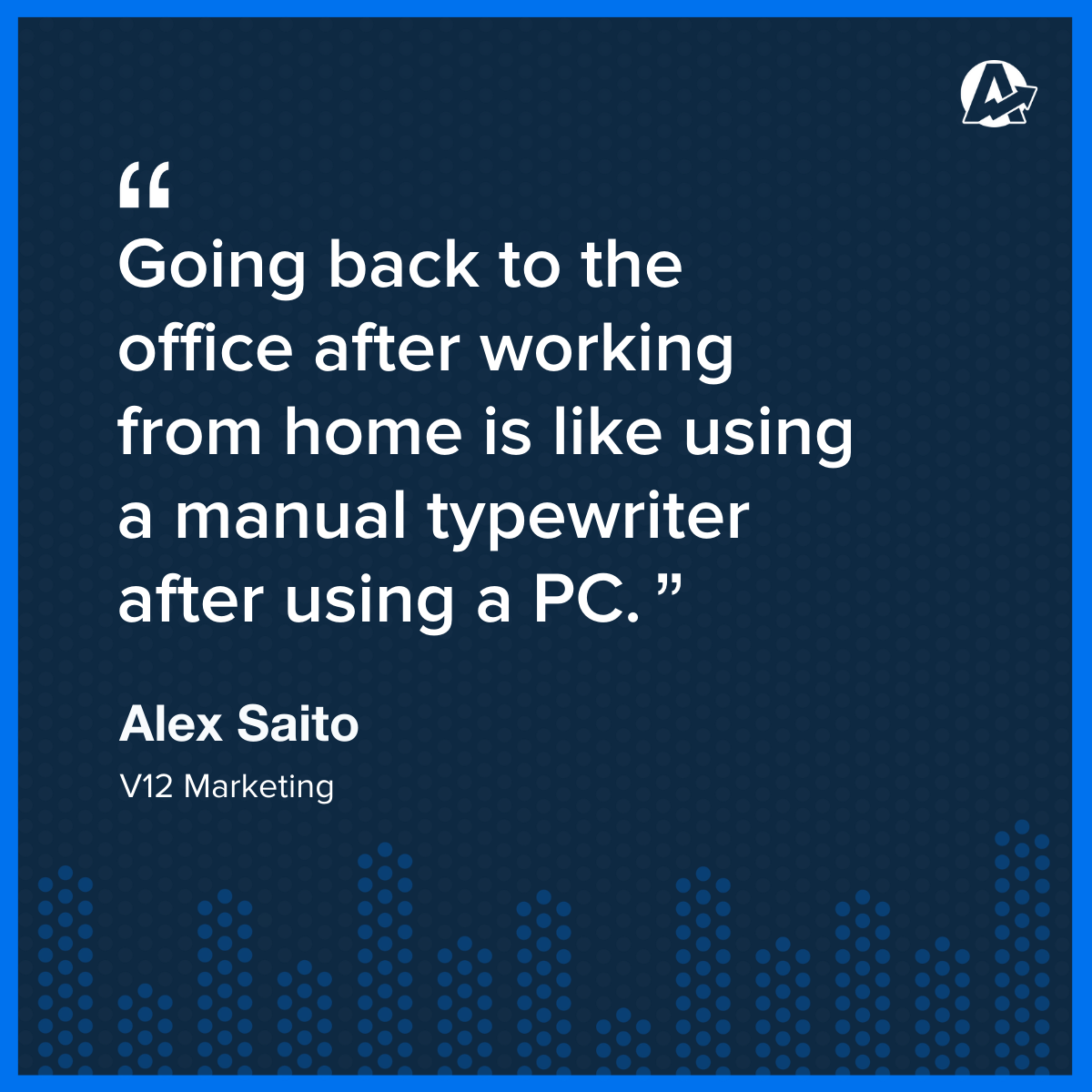Table of Contents
Table of Contents
7,000+ agencies have ditched manual reports. You can too.
Free 14-Day TrialQUICK SUMMARY:
Mandating a return to office can reduce morale, lower productivity, and risk losing top talent. Case studies and data from V12 Marketing show remote work fosters better performance, flexibility, and retention. As work culture evolves, agencies benefit by embracing WFH models over outdated office expectations to stay competitive and attract the best people.
Recent world events have caused a major shift in what the workday looks like for many of us. With the rise of the home office, there have been many debates on the effectiveness, the risks, and the benefits regarding remote work culture.
If you own a marketing agency and are considering mandating your employees to return to the office, read on to learn about the drawbacks–from case studies and our experiences at V12 Marketing.
The Data Shows Employees Will Leave for Other Options
Forcing employees to return to the office may seem like the right solution in the short term, but it can quickly backfire. Many CEOs in recent years have defended their stance, stating that work-from-home damages culture and collaboration. In a hybrid work environment trial, we found that our team preferred a flexible work-from-home approach rather than a more traditional 9-to-5 office setting. This was based on an anonymous voting poll conducted internally, heavily favoring WFH.
The fact is that most employees have come to appreciate the flexibility that comes with working from home, and requiring them to return to the office will only encourage them to look for other jobs that offer this flexibility. The job market has shown a significant demand for not only workers, but remote work is welcome and often favored. Employee retention is a major concern for any business, and mandating a return to the office could prove to be a serious misstep. In this competitive global business economy, it goes without saying that keeping your team productive and happy is among the highest priorities. Agency culture counts.
Our agency realizes that other competitors out there would love to have our talented employees, and allowing a flexible work schedule is one of the few things we can do to gain leverage over other agencies that simply do not offer this.
Something once considered a perk is now becoming more of the standard out of necessity. We know from experience because we have doubled our team from 2020-2023 based on this work-from-home meta.
Employee Productivity Will Suffer Greatly
The data has shown that responsible remote workers are not only happier but have a higher yield of productivity as well as higher quality of work.
Employees have become accustomed to working from home and have been able to remain productive with the help of digital tools and online virtual platforms. In-office meetings have been replaced by Zoom Conferences, and the daily stand-up has been replaced by task management tools like Asana, or Airtable. That weekly meeting is now an email. The shift to remote work has forced us as a society to observe the downfalls of traditional methods.
Within our own agency, we found that not only did our team enjoy the workflow that remote work offers, but it also nurtured personal creativity and self-reliance and allowed us as a business to explore other abstract approaches to our processes.
If employees are forced to return to the office, this could lead to a decrease in productivity due to various factors such as lack of focus, distractions, commute time, etc. This could mean that teams are unable to get as much work done during the day, leading to a decrease in team morale and productivity overall.
With fewer hours spent on actual work, deadlines will be harder to meet, and projects may take longer than expected to complete, leading to scope creep and unhappy clients.

Morale Will Be Greatly Affected
A negative shift in employee morale can make it difficult for a marketing agency to stay competitive, as the quality of its output is directly affected by these negative changes in the psychology of its employees.
When employees are required to return to the office, it could have a negative impact on morale and, in turn, the efficiency of an employee. For an organization to achieve its goals, it is important that employees feel supported, valued, and connected.
Although the Covid-19 pandemic no longer leads the news cycles, that does not mean it is completely over. Employees who are required to come into the office–even if their job does not require their physical presence–will likely feel uncomfortable and stressed due to concerns about safety or commuting in crowded spaces.
Performance metrics have shown that employees who are under more stress and decreased morale not only perform worse but also negatively affect the company's culture as a result.
Stress has also been linked to decreased creativity, as well as reduced job satisfaction, absenteeism, and turnover.
The Way We Work Has Changed Forever
The pandemic has forced businesses, including our agency, to rethink the future of work. Prior to the pandemic, working from home was a rare occurrence for many. Companies are now embracing the idea that “the home is the office.”
Employers realize that it can be just as effective, if not more so, to have employees working from home. They’re also beginning to understand the benefits of cost savings, higher productivity, and improved employee satisfaction.
Employees, too, are beginning to recognize the freedom and flexibility that working from home provides. For example, they no longer have to battle rush hour traffic or wake up early in order to arrive at their workplace on time. Working from home gives them more time to spend with family, exercise, and pursue other interests.
Alex from V12 Marketing says that “going back to the office after working from home is like using a manual typewriter after using a PC for so long.” Convenience and efficiency are two things that are hard to argue against as far as work culture is concerned.
The move towards Work From Home may mean that the traditional office setting is no longer necessary. Only time will tell because this change is still relatively new. Companies now realize they can save money by eliminating overhead costs associated with maintaining a physical space, such as rent, utilities, and supplies.
It’s clear that the future of work will be drastically different than what we’ve been used to for so long.
The cultural shift in how we work has been permanently changed with the embrace of working from home. In fact, the next logical step could be the elusive 4-day work week. Mandating a return-to-office initiative is a step back in the evolution of the workplace, and WFH culture is here to stay.
We have clients all over Northern America with ambitions for global partnerships. Remote work has been essential for us to stay competitive and grow in our industry. We encourage other businesses to see the many benefits of this way of doing things and be early adopters of what we see as the future of work.
Read More About 15 Marketing Agency Management Tips for Growing Agencies

Written by
Mike Visconti is the Creative Director at V12 Marketing
See how 7,000+ marketing agencies help clients win
Free 14-day trial. No credit card required.






